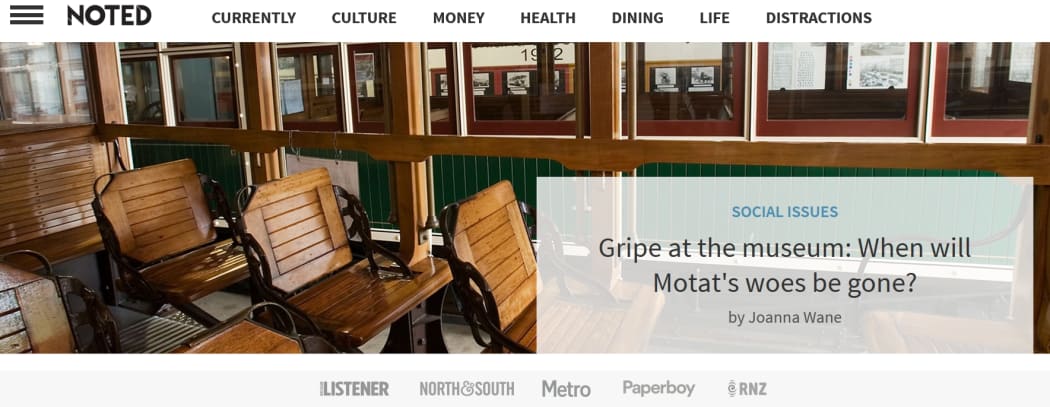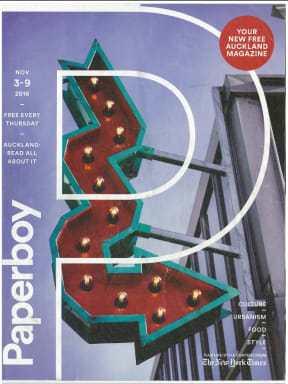Some of the best journalism in New Zealand is in glossy magazines with a premium price on the cover. Why is New Zealand’s dominant magazine publisher suddenly giving it away for nothing in print and online?

The masthead of Bauer Media's new website offering some of its best current affairs journalism. Photo: screenshot
“When you pick up a magazine - you hold the whole world in your hands.”
So says the website of the pre-eminent publisher of magazines here in New Zealand: Bauer Media. The local division of the giant German publisher is almost the whole world in the market for New Zealand magazines.

The new kid on the block in Auckland. Photo: PHOTO / RNZ
It owns Woman’s Day and Womens’ Weekly, Home magazine and Home and Garden. Next, Taste, Simply You, Lucky Break and many more local lifestyle titles all come from the same stable.
Bauer Media recently launched a new one, Nadia, built around entrepreneur and Masterchef winner Nadia Lim.
Its glossy monthly magazines Metro and North & South, and the less glossy weekly The New Zealand Listener, publish some of the best New Zealand journalism in print.
These magazines have premium price tags on the cover and they have loyal and long-established customers.
But last week - without fanfare - Bauer launched a new website offering current affairs content from Metro, North and South and The Listener - all for free - along with content from RNZ.
Noted also has the content from Bauer Media’s new magazine for Auckland called Paperboy, which is published weekly and given away free at public transport points, in letterboxes and at cafes.
Why give away premium content for nothing?
"We have lots of magazines that compete with each other. We've never not done a magazine because we fear taking the audience off another one," Bauer Media’s New Zealand chief executive Paul Dykzeul told Mediawatch.
"We're doing this to target a younger audience that's very difficult to get to. The theory that young people do not read is not right. They just read in a different way," he said.

Bauer Media CEO Paul Dykzeul. Photo: supplied
Bauer's website says "every style-conscious Aucklander would want Metro magazine on their coffee table." But each issue now sells less than 10,000 copies and soon Bauer will only publish it six times a year.
Mr Dykzeul insisted the free weekly Paperboy does not undermine Metro. It would target advertising and readers currently attracted by newspaper supplements on food, fashion and entertainment.
"These types of free magazines have been done successfully in cities in the UK and the US. I think it's long overdue," he said.
Mr Dykzeul said Bauer Media was planning similar free urban magazines for other places, including Wellington.
Words from the sponsor
Traditionally, magazines harvested revenue from advertisers by selling space for ads printed in between the articles.
Today, advertisers want more than just space in print. Sponsored content now blurs the lines between advertising and editorial content and publishers work with commercial clients to create "content solutions".
Mr Dykzeul told Mediawatch it is wrong to confuse readers, and they would desert you if they thought they were being deceived.
"A lot of advertisers want to have integrated content embedded in the editorial. We don't do that," Mr Dykzeul said.
Bauer Media's Paperboy carries advertising from Auckland Council in a page called 'Our Auckland' but it also has a commercial arrangement for content.
A recent memo to Auckland councilors said:
"As part of our arrangement, Bauer Media has also agreed to consistently support select council initiatives in Paperboy editorial content (including in the magazine’s Agenda and Urbanism sections) in addition to the OurAuckland page.
A recent issue of Paperboy carried positive messages about the council's proposed cycle lanes. Does this mean Paperboy publishes propaganda penned by the council for money?
"The arrangement with the council is a terrific one because they've been very supportive of what we are doing," Mr Dykzeul said.
"The vast majority of what they're doing is really important to Aucklanders and its really important they understand it," he said.
Bauer's Metro magazine has often probed, criticised and sometimes even condemned civic projects in Auckland in the past. Can Paperboy really be as critical with commercial deals like this in place?
"Absolutely. If we don't agree with it we're not going to do it. But generally speaking, the information they want us to convey is information of value to readers who want to know what's going on in Auckland," he said.
One hub to hold it all
Bauer Media's head of digital strategy Cathy O’Sullivan told Mediawatch the new site Noted was in part inspired by sites like theatlantic.com and mic.com in the US, and other publishers gathering together their published titles in one digital hub.

Cathy O'Sullivan, the head of digital strategy of Bauer, which has launched the new site Noted. Photo: supplied
"We don't think about the brands but about the audience, whether it comes from North & South or The Listener - or The New York Times or RNZ," she said.
Some articles have been published on Noted before paying customers have seen them in their magazines in print.
Cathy O'Sullivan said timely content will be published online first, but other quality content will be held back. Most of the substantial journalism published by Bauer Media magazines will appear on Noted at some point.
There are also plans for original content created specifically for the site.
"We are already having conversations with freelance journalists about that. It could be a podcast series or a video series. There is endless potential," she said.
For now, the journalism on Noted is available to any browser for free and without registration. Will it always be on offer so freely?
"We may look at a membership strategy in the future," said Cathy O'Sullivan.
"Right now we want to build a new audience," she said.
That new audience they want is clearly the younger one that currently doesn't want to buy magazines, but does love getting stuff for free.

